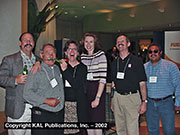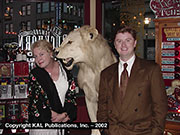
Central Valley Petroleum Industry Golf and Tennis Tournament

Commercial Fueling Network Membership Meeting

Society of Independent Gasoline Marketers of America Spring Meeting
Want to see the photos that didn't make the issue? Check out
the Cutting Room
Floor.
Hawaii
Legislature Votes to Set Cap on Gasoline Prices
Petroleum Industry May Be
Terrorist Target
Tesoro to Acquire
Golden Eagle Refinery
Albertson's To Add
Carwashes, Testing Diesel Sales
EPA Clean Air Study Has Major
Statistical Errors
Fleming Acquires
Core-Mark International
HAWAII LEGISLATURE VOTES TO SET CAP ON GASOLINE PRICES
HONOLULU, HI. — After an extended debate, emotional hearings, and being called dead the day before the close of the session, the Hawaii legislature has voted to enact a cap on gasoline prices.
Under the terms of the Energy Resources, Gasoline Pricing and Petroleum Industry Reporting Act, SB 2179, the Hawaiian government will set maximum wholesale and retail prices for regular unleaded gasoline.
The law will require Hawaii’s state Public Utilities Commission to set a maximum price on gasoline based on an average of prices in the Los Angeles, San Francisco and Pacific Northwest markets. Profit margins will be capped at 16 cents per gallon on regular unleaded gasoline.
Higher prices will be allowed on islands other than Oahu — they may charge an additional eight cents per gallon — and for full-service gasoline. The legislation also requires major oil companies to hand over their internal documents to the Hawaiian government so the state can "monitor their profits."
ChevronTexaco was one of the first to speak out against the new law, noting that "While it is impossible to forecast exactly what will happen in any market, creating a hostile climate for business will inevitably hurt Hawaii and its people."
Gasoline prices on Hawaii have been a hot topic for many years. The Islands generally pay the highest gasoline prices in the United States by a substantial margin. The major oil companies claim this is due to the costs of importing gasoline to Hawaii as well as the higher costs of doing business on the Islands.
Local politicians — and some service station owners — believe, however, that the prices are high in Hawaii because the limited market allows suppliers to keep prices artificially high. They have accused the major oil companies of gouging the public in order to line their own pockets. In this election year, the issue came to a head.
"Without a doubt, for the past decade oil companies have made huge profits at the expense of Hawaii’s consumers," stated Representative Kenneth Hiraki, the chairman of the House Commerce Committee.
Major oil companies argued that market forces should determine the price of gasoline, not a government formula. "We are a firm believer that the consumer is ultimate," said Faye Kurrren, the president of Tesoro Hawaii. "They are the ones who should decide, not government."
Dealers also came to lobby against the bill. "It’s going to damage and hurt small business," said Bill Green, a dealer who operates a Shell station on Oahu. "We’re the people that are out on the firing line. They’re aiming at the big oil companies, trying to figure they can do something about them and all they’re doing is hurting us."
Ken Inouye, owner of Bayside Chevron in Hilo, said that he has already had to lay off employees at his station because of rent increases. With the addition of price caps he predicts that "what probably will happen is the smaller stations will give up or close down."
Jim Coon, who owns the only gasoline station on Lanai, says that the state would have to subsidize his station in order to stay in business because he would have to sell the fuel for less than it costs him to bring it to the island. "Knowing what they need to charge me for gas, they could not get me the gas for as little as the cap," said Coon. At the end of May, he was retailing regular unleaded for $2.44 per gallon and premium for $2.60 per gallon.
Martie and Don Nitsche, owners of the independent branded Ocean View Services gasoline station on Hawaii, predict that the price caps will force them out of business. Ocean View sells between 28,000 and 35,000 gallons of gasoline a month in their rural location as well as operating a small convenience store and auto repair shop. "We employ four people and with price caps we would be forced to close," said Martie Nitsche. "Small stations will go out of business and large corporate-owned stations will take over."
Wholesalers predict the price caps may also force them out of business as their customer base closes. Lanai Oil Company, which specializes in delivering gasoline to more isolated communities, says that it may lose all of its customers due to the price caps. "The gas business is difficult at best," said Al McBarnet Jr., of Lanai Oil, "even without this playing out. It’s a terrible atmosphere to be in now."
Now that the bill has passed, the issue is not closed. The price caps are not scheduled to take effect until 2004. Major supporters of the bill, Hawaii Governor Ben Cayetano and Attorney General Earl Anzai, will both be out of office. Furthermore, as the bill was passed at the end of the last day of the legislative session, a new legislature will be able to take up the issue when they return to the Capitol.
"It’s going to be a major issue next session," predicted Representative Joe Souki. "I’m going to be pushing hard for either repeal or significant changes." Souki says he is looking to change the law because he believes it will harm his constituents in rural areas of Maui. "The measure was hastily crafted at the end of the session," he said, "and no one really studied what was fair or not."
PETROLEUM INDUSTRY MAY BE TERRORIST TARGETWASHINGTON, D.C. — The National Infrastructure Protection Center (NIPC) has issued a notification that the petroleum industry may be a target for terrorist attacks.
The NIPC has confirmed information that terrorist groups are allegedly targeting U.S. petroleum terminals, pipelines, refineries and ships.
In addition, law enforcement and intelligence agencies believe that Islamic extremists "are actively seeking detailed information on U.S. oil company operations." The terrorist groups are also analyzing potential affects of an oil disruption on the United States economy.
The Petroleum Marketers Association of America has issued a reminder to all marketers to make sure their facilities and vehicles are secure. Marketers and their employees are asked to report any "mysterious or unusual events" that they witness at their facility, a terminal, or any location where they pick up loads of fuel. This may include an unusual request for petroleum products as well as a suspicious event.
Any information concerning possible criminal or terrorist activity should be reported to the local FBI office or to the NIPC at 1-888-585-9078.
TESORO TO ACQUIRE GOLDEN EAGLE REFINERYSAN FRANCISCO, CA. — After last-minute negotiations and postponements, Tesoro closed their deal with Valero Energy to acquire the Golden Eagle Refinery for $945 million.
At the same time, Tesoro has acquired 70 Beacon-branded service stations and convenience stores in Northern California. The Beacon-branded stations include 57 company-operated sites and 13 dealer locations.
Last Fall, Valero had agreed to sell the Golden Eagle Refinery and the stations to Tesoro in order to acquire Ultramar Diamond Shamrock. The Federal Trade Commission had required the divestiture to close the UDS purchase.
Valero had agreed to sell the refinery, considered one of the best in the state of California, and the Northern California stations as a condition of acquiring Ultramar Diamond Shamrock at the end of last year. The Federal Trade Commission had found that the UDS-Valero combination would control too much of the refining and marketing business in California if the company was able to keep all of their assets.
With the addition of the Valero stations, Tesoro will now have a position of strength in the highly competitive Western marketplace, operating over 750 stations.
Tesoro Chairman Bruce Smith noted that the purchase of the station and refinery will provide "additional Tesoro supply for independent marketers and expansion of [the] Tesoro brand."
The 168,000-barrel-per-day Golden Eagle refinery in Martinez, CA., is one of the leading producers of CARB reformulated gasoline in the nation and a major supplier to the branded and unbranded market in Northern and Central California.
Smith said Tesoro plans to "retain all the employees, offering them comparable pay and benefits. We value, respect and appreciate the contributions and efforts of the Golden Eagle and Beacon employees. They are a talented group of individuals and we look forward to having them as a part of the Tesoro family."
The purchase closed on May 17.
ALBERTSON'S TO ADD CARWASHES, TESTING DIESEL SALESBOISE, ID. — Albertson’s, Inc. has announced that it plans to add carwashes to its Albertson’s Express fuel centers and may add diesel to the stations.
The planned carwashes will be included in "many" of the new Albertson’s Express sites as well as added to existing locations.
"With each new fuel center we’re building, where it’s possible, where there’s room, we’re going to try to plan a car wash," said Mark Schumacher, corporate fuel center sales manager for Albertson’s, announcing the new program.
Schumacher noted that Albertson’s is — so far — the only major hypermarket to put car washes into its fuel centers. "We’ve not seen the Fred Meyers, Safeways or Krogers with gas put in car washes," Schumacher noted.
Albertson’s reports that it is also testing diesel fuel as a marketing option. The location the grocery store chain recently opened in Hailey, Idaho has begun selling diesel fuel, the first Albertson’s service station to do so.
Albertson’s currently operates over 200 Albertson’s Express fuel centers.
EPA CLEAN AIR STUDY HAS MAJOR STATISTICAL ERRORSWASHINGTON, D.C. — A study used by the Environmental Protection Agency to set standards for the Clean Air Act and emissions contains major statistical errors.
According to the Health Effects Institute of Boston, the air pollution study that was the basis of the EPA’s efforts contains a major software error. The Institute found that the data analyzed has an error rate as high as 23% and that the health risks of air pollution are "more often smaller" than originally believed.
The error-filled study, the National Morbidity, Mortality and Air Pollution Study, was conducted by the Johns Hopkins University in 2000. That study was used by the EPA to set air quality standards and air pollution regulations across the United States.
EPA Spokesman Joe Martyak said that the agency is "in the process of analyzing this right now." In addition, the EPA’s Clean Air Scientific Advisory Committee will review the findings.
FLEMING ACQUIRES CORE-MARK INTERNATIONAL
LEWISVILLE, TX. — Fleming Companies has acquired two major convenience store distributors: Core-Mark International, Inc. and Head Distributing for a combined purchase price of $430 million.
Core-Mark is a major distributor to convenience stores and other retail customers in the West, with 2001 sales of $3.4 billion. With 19 distribution centers across the area, Core-Mark’s customers include Circle K, Phillips Petroleum, Arco’s am/pm stores, EZ Mart, Chevron, Shell, 7-Eleven franchisees, Albertson’s and Safeway.
Head Distributing is a Georgia-based distributor serving the Southeast.
Following the acquisition, Fleming says that it "will have a nationwide network of high-velocity piece-pick distribution centers that will serve approximately one out of every five of the convenience store outlets in the United States, along with many other retail customers." Fleming says it will leverage its position to expand their sales and marketing initiates on a national level.
Originally published in the June 2002 issue of
O&A Marketing News.
Copyright 2002 by KAL Publications Inc.
Serving the 13 Western States, the World's Largest Gasoline, Oil, Fuel, TBA and Automotive Service Market